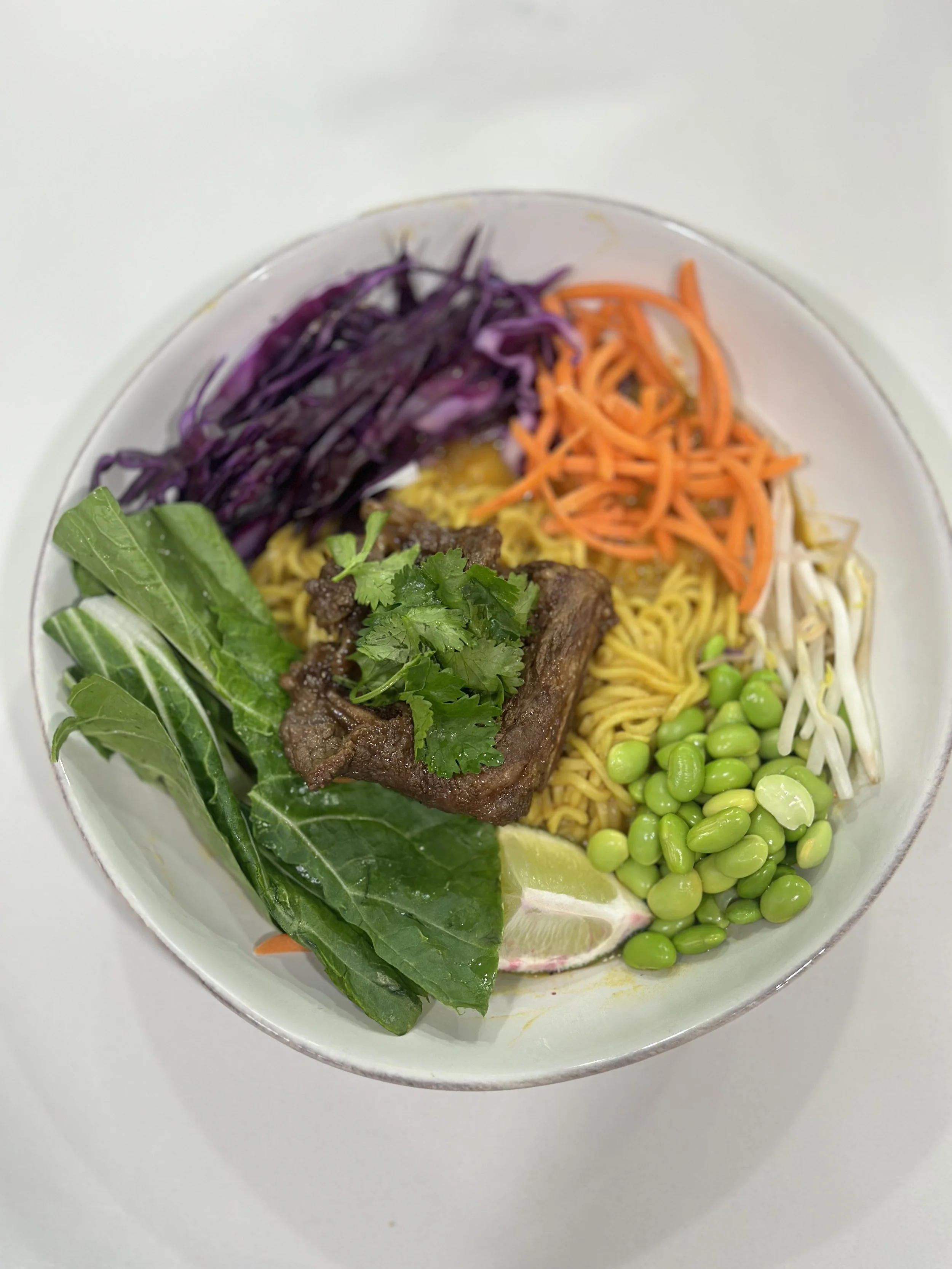Dementia Care Through Diet: A Curry Coconut Ramen Recipe
Caring for a loved one with dementia isn’t just about navigating memory and emotional challenges—it’s also about nourishing them with the right foods. Diet is one of the most important, and often overlooked, aspects of dementia care. For me, making meals for my mom is not just a responsibility—it’s an act of love.
Today, I’m sharing a revamped version of what has become one of my favourite dishes: Curry Coconut Ramen. This upgraded recipe includes tomato paste, red cabbage, cinnamon, edamame, and garam masala for an extra boost of flavour and nutrients.
Why Diet Matters in Dementia Care
Dementia affects every part of life, including the brain’s ability to process nutrients. A diet full of brain-healthy foods can help slow inflammation, support memory, and improve overall health.
Here are some quick do’s and don’ts for a brain-healthy diet:
• Do include: Foods rich in antioxidants (like red cabbage), healthy fats (coconut milk), and anti-inflammatory spices (turmeric, garam masala).
• Don’t include: Processed foods, excessive sugar, or too much salt, which can negatively impact brain function.
Pro Tip: If your loved one is a picky eater, play with flavours and colours—like the vibrant purple of red cabbage or the calming smell of cinnamon.
The Benefits of Coconut in Brain Health
Coconut isn’t just delicious—it’s a nutritional powerhouse for the brain.
1. Healthy fats (MCTs): These provide quick, clean energy for brain cells.
2. Anti-inflammatory properties: Great for reducing inflammation in the brain.
3. Memory support: Some studies suggest coconut oil may help slow cognitive decline.
That’s why coconut milk remains the star of this Curry Coconut Ramen recipe.
Curry Coconut Ramen Recipe
Prep Time: 20 minutes
Cook Time: 25 minutes
Total Time: 45 minutes
Serves: 4
Ingredients:
• 2 tablespoons coconut oil
• 1 small onion, diced
• 3 garlic cloves, minced
• 1 tablespoon fresh ginger, grated
• 1 tablespoon tomato paste
• 1 teaspoon curry powder
• 1 teaspoon garam masala
6-8 baby bok choi, sliced in half (longitudinal halves)
• 1 teaspoon turmeric
• 1 cinnamon stick or 1 teaspoon of cinnamon (optional)
• 1 can (400 ml) coconut milk
• 3 cups vegetable or chicken broth
• 1 tablespoon soy sauce (or coconut aminos for a low-sodium option)
• 1 cup shredded carrots
• 1 cup broccoli florets
• 1 cup shredded red cabbage
• ½ cup edamame (seasoned with a pinch of cinnamon, optional)
• 2-3 packs of ramen noodles (whole grain or low-sodium preferred)
• 1 cup cooked protein (chicken, tofu.) I added Korean short ribs on top.
• Fresh cilantro and lime wedges for garnish
Directions:
1. Start the base: Heat coconut oil in a large pot over medium heat. Add diced onion, garlic, and ginger, sautéing until fragrant (about 30 seconds).
2. Add the spices: Stir in curry powder, turmeric, garam masala, and the optional cinnamon stick or powder. Let the spices bloom for another 30 seconds.
3. Mix in tomato paste: Add and stir well to incorporate its tangy flavour.
4. Go creamy: Pour coconut milk and broth, stirring until smooth. Bring to a simmer.
5. Add the veggies: Stir in carrots, broccoli, red cabbage, and edamame. Simmer for 7-10 minutes until tender. (Sometimes I like to add them on top as a semi-raw option. The colours really pop when raw). Add the baby bok choy last to keep it green.
6. Noodle time: Toss the ramen noodles and cook according to package instructions (usually 3-5 minutes).
7. Add protein: Stir in your cooked protein. Let the flavours meld for another 3 minutes.
8. Taste and finish: Adjust seasoning with soy sauce, honey, or lime juice. Remove the cinnamon stick if used.
9. Serve: Dish up, garnish with fresh cilantro and lime wedges, and enjoy!


